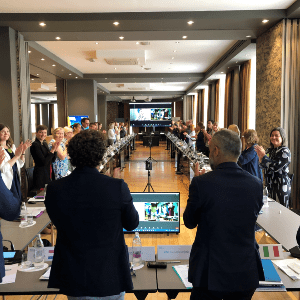 Since the start of the pandemic, two main questions have become the top priority for us. How can we save the economy and how to resist the spread of COVID-19? Over time, another subject was brought into the spotlight. And that is – what changes has the pandemic caused to global climate?
Since the start of the pandemic, two main questions have become the top priority for us. How can we save the economy and how to resist the spread of COVID-19? Over time, another subject was brought into the spotlight. And that is – what changes has the pandemic caused to global climate?
The answer is astonishing. Economic decline, disruptions in transportation and manufacturing industries turned out to have a positive impact on the environment. One of the most illustrative cases was registered in China, where the concentration of nitrogen dioxide in the air dropped dramatically during the lockdown.
As a result, corporations and industries all around the world joined a global trend and started to seek eco-friendly approaches. Many countries are committed to the Paris Climate Agreement and take action to stop global warming.
This international treaty was adopted back in 2015. However, after the readmittance of the U.S. on February 19, 2021, it got into the public eye once again.
In this article, we are going to reveal the most important highlights of this treaty and share the top solutions hotel businesses can apply for faster recovery.
The Paris Agreement and hospitality: decarbonizing the industry
As of March 2021, the Agreement counts 192 parties committed to the mitigation of greenhouse gases. The countries that joined this initiative show great progress in implementing sustainable development and making renewable energies more affordable.
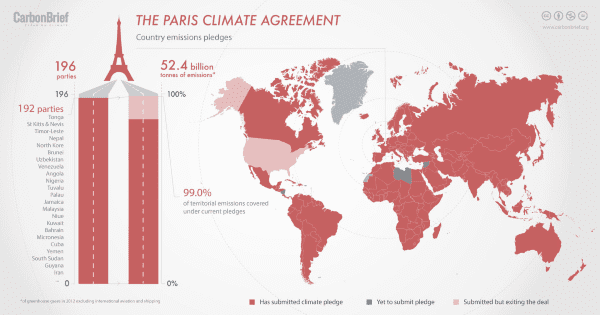
They have also achieved significant results in raising climate change awareness. According to The Climate Change in the American Mind research for April 2020, two in three Americans have a sense of personal duty to help in the combat against climate change.
Some hotel industry giants, such as Marriott International, decided to follow suit. The company’s objectives include a reduction in water usage by 15%, carbon intensity by 30%, and food waste by 50%. Another big goal concerns sustainability certification – 100% of MI hotels are expected to get it by 2025.
During the online UN Climate Change Conference (COP26), its president Alok Sharma encouraged the participants to aim for “a course to net-zero” rate of emissions in the future. As a result, the number of countries planning to implement this approach by 2050 increased by 100 (from 25). If they comply with this strategy, it will be possible to limit the global temperature increase to below 2˚C by 2100.
“Green Premium” concept and innovation
Any of the goals mentioned above cannot be achieved without taking urgent action to address the climate emergencies. But to succeed, humanity must react altogether. We need a viable approach to show the best results.
For that, we should question the difference in cost between products that involve emitting carbon and their “greener” alternatives. This matter has become the main subject of Bill Gates’s book about global warming and a core of his “Green Premium” concept.
The idea behind this concept is that low-carbon products are in many cases more expensive than polluting options. This statement is particularly fair for fuel and electricity. And electricity production creates almost 25% of global greenhouse gas emissions!
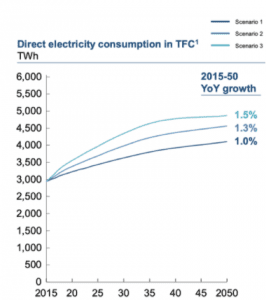
However, in his post on GatesNotes, Bill Gates states that opting for greener alternatives would cost only an extra $18 a month for an average home in the United States. Sure, this may be a significant fee for low-income families. But, in general, it is great news that people can get clean electricity “for the cost of a few cups of coffee each month”.
Still, for big businesses, the difference in cost may be too high. In this case, you can turn to innovation! As Gates emphasizes, “Without innovation, we will not solve climate change. We won’t even come close”.
You acknowledge the importance of taking action on climate change, but not sure how to join this initiative? Let’s see which options are the most effective and affordable for hospitality businesses.
Your roadmap to a sustainable future
For now, the hoteliers are concentrating on recovery and bouncing back to normal. To make this process easier for them and to safeguard the industry, specialists create numerous reopening guidelines.
Here is an overview of the main recommendations on resiliency and sustainability offered by Dr. Willy Legrand, Professor of Hospitality Management at the IUBH International University and co-chair HospitalityNet Sustainability in Hospitality Panel:
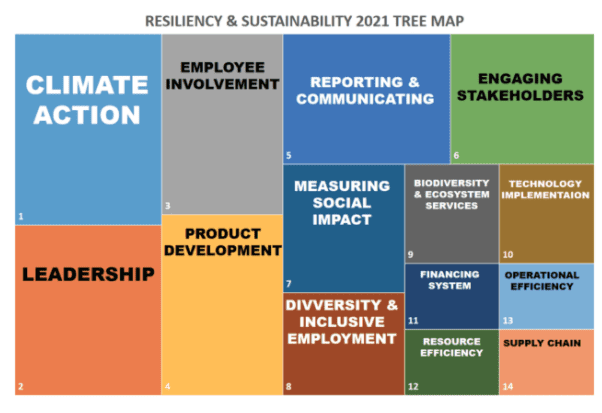
Tech solutions and tips for climate-friendly recovery
Relying on the central points of this overview, we have created several tips for hotels to achieve faster and “greener” rebound:
- Go digital and save the planet
The first thing you need to do in order to cut emissions is to create a Carbon Reduction Plan. The most affordable and effective components of this plan are eco-friendly tech solutions.
We recommend adopting such technologies as mobile check-in/out, online food and services ordering, or payments through smartphones. If you switch to digital accounting and reporting, you will save a considerable sum of money on printing and paper. Offering restaurant visitors digital menus instead of printed ones would also be an appropriate option during the pandemic.
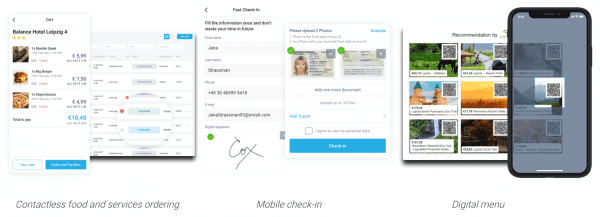
- Ensure your guests that your hotel is COVID-free
The other important points concern reporting, disclosures, and communication. Safety plays a significant role in business promotion and is the basis of brand trust. To show your guests that your region and hotel are both safe to visit, add the HotelFriend COVID safety place widget on your website. This will both enhance trust and attract new customers.
- Become more resilient with smart services
The negative effects of the pandemic affected both employees and communities. Hospitality businesses are often the centers of local spending, sourcing, and employment. Thus, people are the main source of resilience for hotels.
With this in mind, you can start adopting the concept of Smart Resilient Hotel. According to it, hotels with a high degree of digitization are capable of surviving tough times with less damage. So, this way, you can protect your communities from COVID-19 with tech options. They will help you to limit personal contacts between guests and employees. Moreover, you will improve guest service by personalizing it.
- Use nature to your guest’s advantage
A core part of the European Green Deal, the biodiversity strategy is a crucial part of climate protection. Its value was acknowledged years ago. And now it is seen as one of the key landmarks on the way to recovery.
Biodiversity is not just a fancy term from the biology book. It has a practical application and can be used as a source of wellbeing for your guests. After the implementation of stay-at-home orders, people all over the world had developed the nature-deficit disorder. You can bring nature back into their life, for instance, by creating a garden with different local species.
- Follow the new trends
With the changes in the world come changes in customer behavior. In current circumstances, slow travel with fewer vacations is becoming one of the main trends among tourists. Now it stands in line with such popular tendencies as solo and sustainable travel. Prioritize quality over quantity, as your customers do, and look for ways to meet their current needs.
Conclusion
The current state of affairs requires action from representatives of each industry. In addition to climate change, there is now also a pandemic crisis. Hence, we must look for a hybrid strategy to address both issues. In the case of the hospitality industry, the objectives of the Paris Climate Agreement balanced by new technologies may become the core of this strategy.
We can see an identical approach, adopted by such giants as Marriott and Hilton. They have already approved a plan to reduce carbon emissions that they are going to follow for the next decades. And now, thanks to green technologies, every hotel can join this initiative and follow the path of sustainability.




